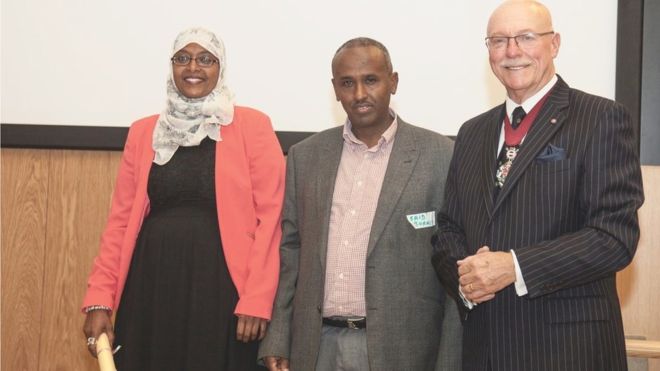By Osob Elmi

The only Somali foster carers in Bristol have called for others from the same background to join them.
The Burale family said more Somali foster homes were needed because of the “importance of matching a child’s cultural and religious identity”.
There are more than 20,000 Somalis in the city – the largest UK community outside London and Birmingham.
Bristol City Council said it wanted to increase numbers through outreach projects for diverse cultures.
While a child’s Muslim faith should be identified when they were taken into care, it would not be possible to identify the specific number of Somali children in care because the children’s cultural identity would not be registered.
The Burale family, from Barton Hill, have fostered more than 10 children over a nine-year period, as well as raising their own four children.
Their foster-children have been English, Somali and Pakistani.
‘Duty and responsibility’
Saed Burale, 49, worked with the council to support non-Muslim foster families with special food requirements, well-being needs and religious practices before he began fostering.
Mr Burale said: “I felt a duty and responsibility to take it upon myself… to become a foster parent.
“It’s hard work but we are happy to do it.”
His wife, Zaynab Ismail, said she believed matching children in care with foster families based on their cultural identity was paramount to “avoid shock caused by the culture differences”.
Her view was confirmed when a 12-year-old girl was placed with them after being taken into care following a family breakdown.
“She told us she had been placed with 25 foster families and it was only when she came to our house that she ‘smelt what home smelt like again’ and that she had ‘always dreamt about being with a Somali family’.
“Living in a diverse city like Bristol, every family and every child has a heritage and culture which needs preserving.
“When a child is placed with a family who is different to them, they have a culture shock that can cause the child emotional damage,” she said.
Lost ‘direction’
Ali, whose real name is not being used because he wanted to remain anonymous, told us he “yearned” for a Somali family when he was fostered at the age of 13 by a white non-religious family.
“I lost all sense of direction with no role model or someone who could show me the ropes in terms of my cultural heritage,” he said.
“Advice was the biggest thing I needed, someone who understood my culture and religious needs.
“The family I was living with fed me non-halal food, they offered me alcohol, which is forbidden in Islam, yet I drank it.”
Ali moved out at the age of 18 and felt he had to “reconnect” with his Somali heritage.
He said it was his view there was a “huge necessity” for children to be matched with someone who identified with them.
The Muslim Fostering Network, which was established in 2017 to encourage more Muslim families to foster, has estimated there are between 5,000 and 7,000 Muslim children in foster care across the region.
The city council said it was “continuously working” to develop its relationship with Bristol’s Somali community.
Saed and Zaynab said they were aware there were misconceptions within the Somali community about becoming a foster parent.
Mrs Ismail said: “There is fear around interference [by the authorities] and families feeling like they are under constant surveillance by social services, when that is not the case.”
Source: BBC


